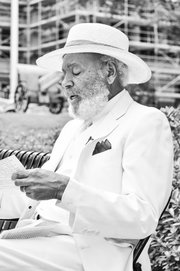James Meredith pointed out that the debate over slavery gave way to the Missouri Compromise of 1820, which allowed slavery in the then-newly proposed state of Missouri but not in new western territories. Photo by Trip Burns.
Racial tension. Days of protests. Violence. The presence of National Guard troops.
It happened 51 years ago in Oxford, when James Meredith became the first black student to enroll at the University of Mississippi. And it's happening right now 400 miles to the north of Oxford in Ferguson, Mo., in the wake of a white police officer shooting and killing 18-year-old African American Mike Brown.
Ferguson police officer Darren Wilson killed Brown, who was on his way to his grandmother's home, on Aug. 9. Since Aug. 10, not a day has gone by without demonstrators crowding onto the streets of Ferguson, some to remember Brown and some to demand that Wilson, who is white, be charged with murder. On several nights, demonstrations have involved clashes between law-enforcement agencies and protesters. Some people looted area businesses and broke the windows out of storefronts, while others tried to stop them.
Meredith, who is known for making provocative statements, said the Ferguson protests are more important historically than even the violence that erupted from his own admission to Ole Miss in 1962.
"The thing that's happening in Ferguson, Mo., is the most important thing that's happened for the black race, particularly young black males, since the 1930s in Scottsboro, Ala.," Meredith told the Jackson Free Press.
In 1931, nine young black men faced several juries in the town of Scottsboro, Ala., when two white women accused them of rape for reasons that remain largely unknown. Each of the Scottsboro Boys served prison time. Five of the boys--Olen Montgomery, Ozie Powell, Willie Roberson, Eugene Williams and Roy Wright--had their convictions overturned in 1937. The judge sentenced another, Clarence Norris, to death, but he escaped and went into hiding. Then-Gov. George Wallace pardoned Norris in 1976; he died in 1989.
Despite its location outside the Deep South, Missouri has often been in the middle of the race debate in the U.S.
Meredith pointed out that the debate over slavery gave way to the Missouri Compromise of 1820, which allowed slavery in the then-newly proposed state of Missouri but not in new western territories. Missouri resistance to ending slavery, or even allowing some states to outlaw slavery, helped start the Civil War. In the late 1850s, Missouri "Border Ruffians" even crossed over into Kansas to force slavery into that then-territory, violently attacking free-state settlements and leading to the moniker, "Bleeding Kansas."
The 1857 Supreme Court decision in the case of a slave named Dred Scott made it so that black slaves remained property even in parts of the nation that outlawed slavery.
In that sense, the Show Me State makes a natural front for today's racial conversation, Meredith said.
"The (battle) lines are drawn in Missouri," he said.
Meredith is starting an organization that encourages African American elders to read and understand the Bible and to pass its lessons to young people. He wants the group, The Bible Society, to have a presence in each Mississippi county and eventually to have charters in cities around the U.S.
"The only way to train the youth is for the elders to do their jobs," Meredith said.
See the JFP's full archive of Ferguson coverage here.




Comments